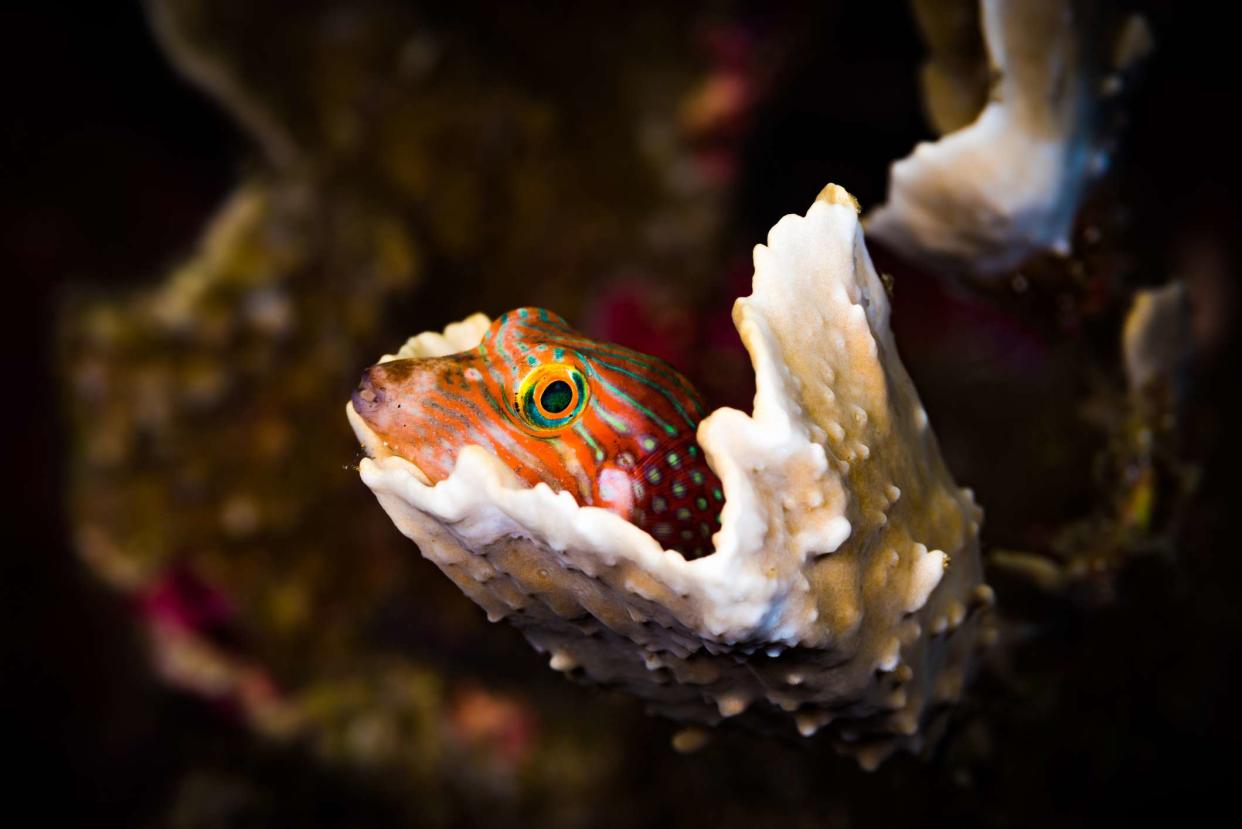Do Fish Sleep?

RibeirodosSantos/Getty Images
A common question among fish owners is: “Do fish sleep?” Simple answer: yes, but sleep in fish may not look like what you’d expect. Fish require sleep, like most other vertebrates, as part of their normal body functions, but they don’t require a bed, any bed covers, or even eyelids. Here's how fish sleep and how you can tell when your fish is sleeping.
Do Fish Sleep?
Yes, fish sleep. Fish sleep is the equivalent of lower brain function, despite basic external appearances that your fish might still be awake. Sleep is regulated very similarly to humans and other mammals, as shown in studies on zebrafish. Studies have also shown that zebrafish species can exhibit at least two sleep cycles similar to other sleep states in other higher vertebrates. Although not every single species has been studied, and those that have only limited data has been collected, it can be assumed that most fish species have similar sleep processes.
How Do Fish Sleep?
Unlike terrestrial vertebrates, within an aqueous environment, it is not possible for fish to rest in one place. Depending on their buoyancy and local currents, any fish that stops swimming and turns off their local awareness is at risk for drifting away from safety and turning into an easy snack. Some species, such as the triggerfish, can anchor themselves into a crevice using specialized fin adaptations that lock them into place. Those fish that swim in schools can rely on their nearby neighbors to alert them to incoming trouble if necessary.
Sleep state in fish can be considered “low power mode.” Fish are still able to maintain breathing and minor external movements. Fish breathing strategies are broken into ram and pump ventilation. Ram ventilators, commonly many open ocean shark and large fish species, have to swim to pump water over their gills. Sleep in these species requires forward movement or else they will not be able to breathe and likely sink to the bottom of the ocean. Pump or buccal ventilators, such as most reef and common aquarium fish species, open and close their mouths to breathe, meaning they can rest in one place provided they continue to open and close their mouth.
How Can You Tell When a Fish Is Sleeping?
Since they are not all tucked into bed to sleep, knowing when your fish is asleep and providing adequate night time is essential to the overall health of your fish. Studies have actually shown that fish can show signs of sleep deprivation just like in other vertebrate animals. It is critical to provide your aquarium with a diurnal light and dark period in order to allow your fish to sleep soundly. You can use ambient lighting, a timed aquarium light, or turn your lights on and off manually in order to provide your fish with at least 8 hours of darkness. Depending on the species in your aquarium, dark periods may vary. And not all species will appreciate bright lighting. Be sure you do your research before you potentially blind your lower-light species.
Fish do not have eyelids, so you cannot use closed eyes to tell if they are sleeping. Eyelids in terrestrial animals are responsible for keeping corneas lubricated, which isn’t an issue underwater, when eyes are constantly moist. So, just because your fish's eyes are open, your fish may not be completely awake. They may be swimming and breathing, but they might not be aware of much else around them.
Tank Location
Fish that are asleep will often be hovering just off the bottom or resting on the bottom of their tank or pond. Schooling fishes will often be in a small group while others may have a specific spot in the aquarium they prefer to rest in. This may be a corner or cave that can provide some basic protection from predators. If your fish is asleep and suddenly startled, they can cause injury trying to quickly get away from danger, usually colliding with the side of their tank or a décor item. Being prey animals, most fish will have a very quick flight or fight response if surprised.
Noise and Lighting
During dark periods, avoid any sudden vibrations, such as slamming doors or loud noises, and do not stick anything into the tank or pond. Do not allow any pets, such as cats, access to your tank when your fish are sleeping. Not only will they be frightened if their environment is disturbed, but they will be very easy targets for any potential predators.
When changing from darkness to daytime, it is best if the aquarium lighting gradually brightens. You can do this by turning on a dim room light away from the aquarium for a while before turning on the actual aquarium light. Newer aquarium hoods with LED lighting can even be programmed to gradually brighten at dawn and also gradually dim at dusk, simulating natural day/night cycles. That is better than abruptly turning on the aquarium light in the morning and turning it off again at night.

